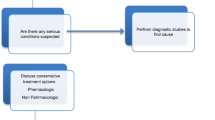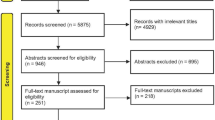Abstract
Posterior operative approach has been the standard treatment for cervical compressive myelopathy, and axial pain after laminoplasty or laminectomy as a postoperative complication is now gradually receiving more and more attention. The objective of this study was to provide a systematic review of the current understanding of axial pain after cervical laminoplasty and laminectomy, and summarize clinical features, influence factors and preventive measures of axial pain after posterior decompressive surgery based on a review of literature published in the English language. Axial pain distributes over nuchal, periscapular and shoulder regions. Posterior surgery is not the major cause of axial pain, but axial pain can be worsened by the procedure. There are many clinical factors that influence postoperative axial pain such as age, preoperative axial pain, different surgical technique and postoperative management, but most of them are still controversial. Several surgical modifications have been innovated to reduce axial pain. Less invasive surgery, reconstruction of the extensor musculature, avoiding detachment of the semispinalis cervicis muscle and early removal of external immobilization have proved to be effective. Axial pain is under the influence of multiple factors, so comprehensive methods are required to reduce and avoid the postoperative axial pain. Because of methodological shortcomings in publications included in this systematic review, different results from different studies may be produced due to differences in study design, evaluation criteria, sample size, and incidence or severity of axial pain. More high-quality studies are necessary for drawing more reliable and convincing conclusions.
Similar content being viewed by others
References
Edwards CC II, Heller JG, Murakami H (2002) Corpectomy versus laminoplasty for multilevel cervical myelopathy: an independent matched-cohort analysis. Spine 27:1168–1175
Edwards CC II, Heller JG, Silcox DH III (2000) T-saw laminoplasty for the management of cervical spondylotic myelopathy: clinical and radiographic outcome. Spine 25:1788–1794
Guigui P, Benoist M, Deburge A (1998) Spinal deformity and instability after multilevel cervical laminectomy for spondylotic myelopathy. Spine 23:440–447
Hardman J, Graf O, Kouloumberis PE, Gao WH, Chan M, Roitberg BZ (2009) Clinical and functional outcomes of laminoplasty and laminectomy. Neurol Res 8:1–5
Heller JG, Edwards CC II, Murakami H, Rodts GE (2001) Laminoplasty versus laminectomy and fusion for multilevel cervical myelopathy: an independent matched cohort analysis. Spine 26:1330–1336
Higashino K, Katoh S, Sairyo K, Sakai T, Kosaka H, Yasui N (2006) Preservation of C7 spinous process does not influence the long-term outcome after laminoplasty for cervical spondylotic myelopathy. Int Orthop 30:362–365
Hosono N, Sakaura H, Mukai Y, Fujii R, Yoshikawa H (2006) C3–6 laminoplasty takes over C3–7 laminoplasty with significantly lower incidence of axial neck pain. Eur Spine J 15:1375–1379
Hosono N, Sakaura H, Mukai Y, Ishii T, Yoshikawa H (2005) En bloc laminoplasty without dissection of paraspinal muscles. J Neurosurg Spine 3:29–33
Hosono N, Sakaura H, Mukai Y, Yoshikawa H (2007) The source of axial pain after cervical laminoplasty-C7 is more crucial than deep extensor muscles. Spine 32:2985–2988
Hosono N, Yonenobu K, Ono K (1996) Neck and shoulder pain after laminoplasty. A noticeable complication. Spine 21:1969–1973
Hyun SJ, Rhim SC, Roh SW, Kang SH, Riew KD (2009) The time course of range of motion loss after cervical laminoplasty: a prospective study with minimum two-year follow-up. Spine 34:1134–1139
Iizuka H, Nakagawa Y, Shimegi A, Tsutsumi S, Toda N, Takagishi K, Shimizu T (2005) Clinical results after cervical laminoplasty: differences due to the duration of wearing a cervical collar. J Spinal Disord Tech 18:489–491
Iizuka H, Shimizu T, Tateno K, Toda N, Edakuni H, Shimada H, Takagishi K (2001) Extensor musculature of the cervical spine after laminoplasty: morphologic evaluation by coronal view of the magnetic resonance image. Spine 26:2220–2226
Kaminsky SB, Clark CR, Traynelis VC (2004) Operative treatment of cervical spondylotic myelopathy and radiculopathy: a comparison of laminectomy and laminoplasty at five year average follow-up. Iowa Orthop J 24:95–105
Kang SH, Rhim SC, Roh SW, Jeon SR, Baek HC (2007) Postlaminoplasty cervical range of motion: early results. J Neurosurg Spine 6:386–390
Kato M, Nakamura H, Konishi S, Dohzono S, Toyoda H, Fukushima W, Kondo K, Matsuda H (2008) Effect of preserving paraspinal muscles on postoperative axial pain in the selective cervical laminoplasty. Spine 33:E455–E459
Kawaguchi Y, Kanamori M, Ishiara H, Nobukiyo M, Seki S, Kimura T (2003) Preventive measures for axial symptoms following cervical laminoplasty. J Spinal Disord Tech 16:497–501
Kawaguchi Y, Kanamori M, Ishihara H, Ohmori K, Nakamura H, Kimura T (2003) Minimum 10-year followup after en bloc cervical laminoplasty. Clin Orthop Relat Res 411:129–139
Kawaguchi Y, Matsui H, Ishihara H, Gejo R, Yoshino O (1999) Axial symptoms after en bloc cervical laminoplasty. J Spinal Disord 12:392–395
Kawakami M, Tamaki T, Ando M, Yamada H, Matsumoto T, Yoshida M (2002) Preoperative instability does not influence the clinical outcome in patients with cervical spondylotic myelopathy treated with expansive laminoplasty. J Spinal Disord Tech 15:277–283
Kawakami M, Tamaki T, Iwasaki H, Yoshida M, Ando M, Yamada H (2000) A comparative study of surgical approaches for cervical compressive myelopathy. Clin Orthop Relat Res 381:129–136
Kotani Y, Abumi K, Ito M, Sudo H, Takahata M, Ohshima S, Hojo Y, Minami A (2009) Minimum 2-year outcome of cervical laminoplasty with deep extensor muscle-preserving approach: impact on cervical spine function and quality of life. Eur Spine J 18:663–671
Kowatari K, Ueyama K, Sannohe A, Yamasaki Y (2009) Preserving the C7 spinous process with its muscles attached: effect on axial symptoms after cervical laminoplasty. J Orthop Sci 14:279–284
Liu J, Ebraheim NA, Sanford CG Jr, Patil V, Haman SP, Ren L, Yang H (2007) Preservation of the spinous process–ligament–muscle complex to prevent kyphotic deformity following laminoplasty. Spine J 7:159–164
Martin-Benlloch JA, Maruenda-Paulino JI, Barra-Pla A, Laguia-Garzaran M (2003) Expansive laminoplasty as a method for managing cervical multilevel spondylotic myelopathy. Spine 28:680–684
Matsumoto M, Watanabe K, Tsuji T, Ishii K, Takaishi H, Nakamura M, Toyama Y, Chiba K (2008) Risk factors for closure of lamina after open-door laminoplasty. J Neurosurg Spine 9:530–537
Matsunaga S, Sakou T, Nakanisi K (1999) Analysis of the cervical spine alignment following laminoplasty and laminectomy. Spinal Cord 37:20–24
Mikawa Y, Shikata J, Yamamuro T (1987) Spinal deformity and instability after multilevel cervical laminectomy. Spine 12:6–11
Nakama S, Nitanai K, Oohashi Y, Endo T, Hoshino Y (2003) Cervical muscle strength after laminoplasty. J Orthop Sci 8:36–40
Ohnari H, Sasai K, Akagi S, Iida H, Takanori S, Kato I (2006) Investigation of axial symptoms after cervical laminoplasty, using questionnaire survey. Spine J 6:221–227
Okada M, Minamide A, Endo T, Yoshida M, Kawakami M, Ando M, Hashizume H, Nakagawa Y, Maio K (2009) A prospective randomized study of clinical outcomes in patients with cervical compressive myelopathy treated with open-door or French-door laminoplasty. Spine 34:1119–1126
Ono A, Tonosaki Y, Yokoyama T, Aburakawa S, Takeuchi K, Numasawa T, Wada K, Kachi T, Toh S (2008) Surgical anatomy of the nuchal muscles in the posterior cervicothoracic junction: significance of the preservation of the C7 spinous process in cervical laminoplasty. Spine 33:E349–E354
Otani K, Sato K, Yabuki S, Iwabuchi M, Kikuchi S (2009) A segmental partial laminectomy for cervical spondylotic myelopathy: anatomical basis and clinical outcome in comparison with expansive open-door laminoplasty. Spine 34:268–273
Sakaura H, Hosono N, Mukai Y, Fujii R, Iwasaki M, Yoshikawa H (2007) Persistent local pain after posterior spine surgery for thoracic lesions. J Spinal Disord Tech 20:226–228
Sakaura H, Hosono N, Mukai Y, Ishii T, Iwasaki M, Yoshikawa H (2005) Long-term outcome of laminoplasty for cervical myelopathy due to disc herniation: a comparative study of laminoplasty and anterior spinal fusion. Spine 30:756–759
Sakaura H, Hosono N, Mukai Y, Oshima K, Iwasaki M, Yoshikawa H (2008) Preservation of the nuchal ligament plays an important role in preventing unfavorable radiologic changes after laminoplasty. J Spinal Disord Tech 21:338–343
Sasai K, Saito T, Ohnari H, Yamamoto T, Kasuya T, Wakabayashi E, Akagi S, Iida H (2005) Microsurgical posterior herniotomy with en bloc laminoplasty: alternative method for treating cervical disc herniation. J Spinal Disord Tech 18:171–177
Shiraishi T (2002) Skip laminectomy—a new treatment for cervical spondylotic myelopathy, preserving bilateral muscular attachments to the spinous processes: a preliminary report. Spine J 2:108–115
Shiraishi T (2002) A new technique for exposure of the cervical spine laminae: technical note. J Neurosurg 96:122–126
Shiraishi T, Fukuda K, Yato Y, Nakamura M, Ikegami T (2003) Results of skip laminectomy: minimum 2-year follow-up study compared with open-door laminoplasty. Spine 28:2667–2672
Takeuchi K, Yokoyama T, Aburakawa S, Saito A, Numasawa T, Iwasaki T, Itabashi T, Okada A, Ito J, Ueyama K, Toh S (2005) Axial symptoms after cervical laminoplasty with C3 laminectomy compared with conventional C3–C7 laminoplasty: a modified laminoplasty preserving the semispinalis cervicis inserted into axis. Spine 30:2544–2549
Takeuchi T, Shono Y (2007) Importance of preserving the C7 spinous process and attached nuchal ligament in French-door laminoplasty to reduce postoperative axial symptoms. Eur Spine J 16:1417–1422
Tanaka N, Nakanishi K, Fujimoto Y, Sasaki H, Kamei N, Hamasaki T, Yamada K, Yamamoto R, Nakamae T, Ochi M (2008) Expansive laminoplasty for cervical myelopathy with interconnected porous calcium hydroxyapatite ceramic spacers: comparison with autogenous bone spacers. J Spinal Disord Tech 21:547–552
Tsuji T, Asazuma T, Masuoka K, Yasuoka H, Motosuneya T, Sakai T, Nemoto K (2007) Retrospective cohort study between selective and standard C3–7 laminoplasty: minimum 2-year follow-up study. Eur Spine J 16:2072–2077
Wada E, Suzuki S, Kanazawa A, Matsuoka T, Miyamoto S, Yonenobu K (2001) Subtotal corpectomy versus laminoplasty for multilevel cervical spondylotic myelopathy: a long-term follow-up study over 10 years. Spine 26:1443–1448
Yabuki S, Kikuchi S (2005) Endoscopic partial laminectomy for cervical myelopathy. J Neurosurg Spine 2:170–174
Yoshida M, Tamaki T, Kawakami M, Nakatani N, Ando M, Yamada H, Hayashi N (2002) Does reconstruction of posterior ligamentous complex with extensor musculature decrease axial symptoms after cervical laminoplasty? Spine 27:1414–1418
Yukawa Y, Kato F, Ito K, Horie Y, Hida T, Ito Z, Matsuyama Y (2007) Laminoplasty and skip laminectomy for cervical compressive myelopathy: range of motion, postoperative neck pain, and surgical outcomes in a randomized prospective study. Spine 32:1980–1985
Conflict of interest
None.
Author information
Authors and Affiliations
Corresponding author
Rights and permissions
About this article
Cite this article
Wang, SJ., Jiang, SD., Jiang, LS. et al. Axial pain after posterior cervical spine surgery: a systematic review. Eur Spine J 20, 185–194 (2011). https://doi.org/10.1007/s00586-010-1600-x
Received:
Revised:
Accepted:
Published:
Issue Date:
DOI: https://doi.org/10.1007/s00586-010-1600-x




